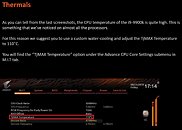Monday, October 15th 2018

GIGABYTE Z390 OC Guide Suggests Intel 9000 Series Processors Will Run Hot Even With Custom Watercooling
It seems that by the time NDA drops on Intel's latest and greatest mainstream processor platform, we will have known more about it than ever before with similar launches. GIGABYTE joined the club with the release of their Z390 overclocking (OC) guide specific to their AORUS-branded motherboards. This contains a lot of useful information in general, and we certainly recommend taking a look at it in the source linked in the full post. As it is, a few items in the guide caught our eye- in particular, a direct quote saying "As you can tell from the last screenshots, the CPU temperature of the i9-9900k is quite high. This is something that we've noticed on almost all the processors. For this reason we suggest you to use a custom water-cooling and adjust the TjMAX Temperature to 110°C."
The quote references their guide to achieve a stable 5 GHz overclock on all cores on the Core i9-9900K, which was cooled via a custom watercooled setup and a Vcore ranging from 1.3-1.4 V. GIGABYTE's internal testing thus indicates that these higher end, unlocked 9000-series CPUs will run incredibly hot if you wish to push them, and the soldered IHS may not be as effective in cooling these dense processors as we may have hoped. Indeed, with news of the 28-core Xeon using thermal paste for the IHS, it appears that Intel may be conflicted on optimal cooling when battling the Core Wars with AMD.
Source:
Gigabyte Z390 OC Guide
The quote references their guide to achieve a stable 5 GHz overclock on all cores on the Core i9-9900K, which was cooled via a custom watercooled setup and a Vcore ranging from 1.3-1.4 V. GIGABYTE's internal testing thus indicates that these higher end, unlocked 9000-series CPUs will run incredibly hot if you wish to push them, and the soldered IHS may not be as effective in cooling these dense processors as we may have hoped. Indeed, with news of the 28-core Xeon using thermal paste for the IHS, it appears that Intel may be conflicted on optimal cooling when battling the Core Wars with AMD.


45 Comments on GIGABYTE Z390 OC Guide Suggests Intel 9000 Series Processors Will Run Hot Even With Custom Watercooling
I expected much lower temperatures with decent cooling.
Gigabyte recommends setting TjMAX to 110C so the CPU wont throttle?
If from that screenshot above, note the 1.5V.
Meanwhile the guide recommends 1.3V - 1.4V.
Now for the cpu. I don't see where exactly does it state 1.5V as somebody mentioned. All i see is vCore being 1.27-1.28V
This is some bullshit. I dont like hot running chips, and it runs 5Ghz anyway on stock voltage with less cores. Its not really worth the effort if its going to run that hot.
What kind of temps with stock voltage?
Or it can be the VDroop on this board is so bad that you must set 1.5V in the bios to get 1.3V load.
Solder seems to be pretty equal to liquid metal in terms of temp drop.
Temp spikes are also gone. 8700K spiked instantly under load (before delid). Solder is a huge step forward here. Temp variance across cores are low too.
I truly believe that a healthy OC to 9th gen system is to separate AVX with an offset, because otherwise you might miss a potentially superb core frequency for all the non-AVX needs.
He's talking about VRM design.
Well he might also not be correct, because gigabyte has really nice VRM boards here and there in every generation. And i must say, every manufacturer does too.
They all have crap motherboards and good motherboards.
The new GB Z390 boards going up from Elite have a decent VRM design because they are not just doubling the count of components (as in fake phases), they are actually using smart doublers.
The same cannot be told about Master board, it has a doubler, but it's not smart. In anyway, Z390 GB boards are almost 12 phases. Almost is because it's not true 12 phase but doubled 6, but it's arguably better than true 8 phase.
The only thing i am dissapointed about GB is that they did not use ISL99227 power stages as they did with their Z370 gaming 7 board.
They would have zero problems passively cooling the VRM even with the i9-9900k.
ISL99227 are being used in AsRock Z390 phantom gaming ITX tho, which is awesome, but low phase count will have harder time running big guys.
i just advice friends to avoid them altogether.